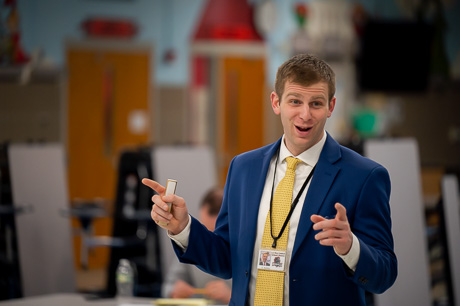
In 2018, Le Roy started phasing out the traditional ranking of top students based on GPA, instituting instead a system that would also take into account challenging coursework.
A senior could no longer skate by on easy electives or study hall to preserve a high GPA. In the new system, students would need to acquire points in Advance Placement classes, for example, to achieve Summa Cum Laude.
High School Principal David Russell, who was hired after the 2018 revisions, introduced modifications to the Laude System to the Board of Education at its last meeting that would further encourage students to aim for high achievement instead of competing with classmates.
"We want to push students to make sure they're pushing themselves," Russell said.
The proposed revisions would be based on the total number of credits a student takes and a cumulative GPA. Each course would be valued the same as the number of credits the course is worth on a transcript. Students taking AP courses and CTE courses that have college credit would continue to receive an additional five points added to their average for that course.
The maximum possible score would be 36 total credits with a 100 GPA. To achieve Summa Cum Laude, a student would need at least 32 credits and a 95 GPA. Magna Cum Laude would be 30 credits and a 90 GPA. Cum Laude would be 28 total credits and an 85 GPA.
Cum Laude is Latin for "with distinction." Magna Cum Laude means "with great distinction," and Summa Cum Laude means "with highest distinction."
The Class of 2023 will be the last class to graduate under the Top 10 system. The classes of 2024, 2025 and 2026 are under the Laude system but will be eligible to move up to a higher Laude if they qualify for a higher Laude under the proposed revisions. If the revisions are approved, the Class of 2027 would be the first class to graduate under this new Laude system.
The goal of the Laude system is to give every student who makes the effort, regardless of life or career goals -- whether in a STEM field, the arts, or athletics -- to graduate with a Laude distinction. Every pathway, Russell explained, gives students who work hard to achieve distinction for the effort.
"One of our fundamental pillars as a public school is to create opportunities for whatever pathway students take on, we're helping prepare them for whatever future they want to go into," Russell said.
The Laude system, Superintendent Merritt Holly noted, is the antidote for "senioritis."
"When we look at the class rank, what we're in right now, that one ends at the end of the first semester," Holly said. "So in January, the Top 10 is really set and done at that point. One of the things you'll hear from the committee and our teachers always is 'senioritis' sets in. As Dave mentioned, what I like about this is it can run all the way up to the end of the school year."
The class rank system does require some hand calculation, Holly said, which is why the class rank is set after the first system. And Russell noted that the class rank is made public, which encourages students to compete against each other.
In the Laude system, only the student, his or her parents, and school counselors will know if a student is headed toward a Laude tier. There is no competition.
"That (competition) can really be unhealthy at times," Russell said.
The rank system also produces the graduation speakers -- the valedictorian and salutatorian. In the new system, students can nominate themselves or others to speak at graduation. School administrators will review those nominations to ensure those truly worthy of speaking will be given the opportunity to be selected as class speakers in a vote of their peers.
The Board of Education will vote at its April 11 meeting on whether or not to accept the proposed revisions.
Photo: Principal David Russell. Photo by Howard Owens.
